课外翻译作业汉译英1参考译文
汉译英短文翻译

在从前的农业社会里,中国人最重要的节日就是过年。
对过去的一年来说,这是结束;对未来的一年来说,这是开始。
一进入腊月,街头巷尾就充满了过年的气氛,这种气氛要持续一个半月之久。
大家通过各种游乐节目来调剂一年来的辛劳,在游乐中流露着一种乐观进取的精神。
过年时,每家门上都贴上了春联,耀眼的红纸给人们带来了喜气,优美的字句提供了勉励。
In previous/former agricultural society, the Spring Festival was the most important holiday in China. It is the end of the past year and the beginning of the next. As soon as the twelfth month of the lunar year begins, streets are filled with an atmosphere of celebrating the Spring Festival for a month and a half. People relax and get rid of the past year’s hard work by a variety of entertainment with a sense of optimism and enterprise. During the holiday, Spring Festival couplets are put on the door of every household. The shining red paper brings happiness to people, and the elegant/graceful words offers encouragement.上海是一座朝气蓬勃、充满活力、多姿多彩的国际化大都市。
汉译英(Unit1、2、3、5课后翻译)
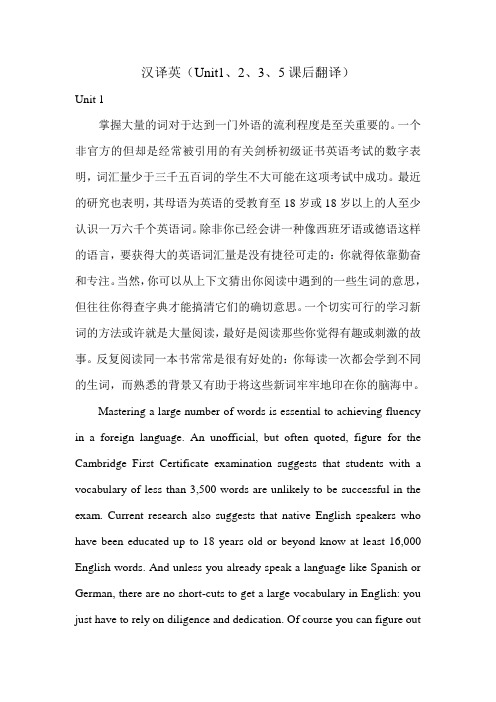
汉译英(Unit1、2、3、5课后翻译)Unit 1掌握大量的词对于达到一门外语的流利程度是至关重要的。
一个非官方的但却是经常被引用的有关剑桥初级证书英语考试的数字表明,词汇量少于三千五百词的学生不大可能在这项考试中成功。
最近的研究也表明,其母语为英语的受教育至18岁或18岁以上的人至少认识一万六千个英语词。
除非你已经会讲一种像西班牙语或德语这样的语言,要获得大的英语词汇量是没有捷径可走的:你就得依靠勤奋和专注。
当然,你可以从上下文猜出你阅读中遇到的一些生词的意思,但往往你得查字典才能搞清它们的确切意思。
一个切实可行的学习新词的方法或许就是大量阅读,最好是阅读那些你觉得有趣或刺激的故事。
反复阅读同一本书常常是很有好处的:你每读一次都会学到不同的生词,而熟悉的背景又有助于将这些新词牢牢地印在你的脑海中。
Mastering a large number of words is essential to achieving fluency in a foreign language. An unofficial, but often quoted, figure for the Cambridge First Certificate examination suggests that students with a vocabulary of less than 3,500 words are unlikely to be successful in the exam. Current research also suggests that native English speakers who have been educated up to 18 years old or beyond know at least 16,000 English words. And unless you already speak a language like Spanish or German, there are no short-cuts to get a large vocabulary in English: you just have to rely on diligence and dedication. Of course you can figure outfrom the context the meanings of some new words you come across in your reading, but more often than not you have to look them up in a dictionary in order to be clear about their accurate meanings. A practicable way to pick up new words may be to read a lot, preferably stories that you find interesting or exciting. It's often good to read the same book over and over again: every time you read it, you will learn different new words, and the familiar context helps to fix them in your mind.Unit 21、我认为向他求助是不现实的。
段落翻译练习-汉译英答案

汉译英:1徐霞客一生周游考察了十六个省,足迹几乎遍及全国。
他在考察的过程中,从来不盲目迷信书本上的结论。
他发现前人研究地理的记载有许多很不可靠的地方。
为了进行真实细致的考察,他很少乘车坐船,几乎全靠双脚翻山越岭,长途跋涉;为了弄清大自然的真相,他总是挑选道路艰险的山区,人迹稀少的森林进行考察,发现了许多奇山秀景;他常常选择不同的时间和季节,多次重游各地名山,反复观察变换的奇景。
Xu Xiake toured and investigated 16 provinces in his lifetime, covering almost the whole of China/ the whole country. When he was carrying out his investigations, he never took blind belief in the conclusions in the books. Instead he found a lot of unreliable points in the geographic records taken by his predecessors. In order to make his investigations reliable and thorough, he seldom traveled by carriage or boat. Instead, he took long, arduous trips on foot almost all the time, climbing mountains and hills. In order to learn about the truth of nature, he always chose to conduct investigations in mountainous areas with dangerous roads and in lonely / untraveled woods, where he discovered a lot of magnificent peaks and beautiful sights.( During his life time, Xu Xiake visited and explored 16 provinces, leaving his footprints in nearly every corner of the country. He never blindly accepted the conclusions given in books in his exploration. He found that many of the geographical records by other people before him were inaccurate ( He found many inaccuracies in the travel notes ongeography written by his predecessors ) . He seldom traveled by horse cart or boat but climbed mountains and ridges and took long, difficult journeys most of the timewith the aim of conducting a real and careful exploration. To get a true picture of nature, he picked/chose mountains with treacherous pathsand unfrequented jungles for explorations, discovering many grotesque mountains and beautiful sceneries. He would revisit famous mountains at different time and in different seasons to observe the changing magnificent views time and again. )2多少年来,我养成了一个习惯:每天早晨四点在黎明以前起床工作。
英译汉-翻译参考译文
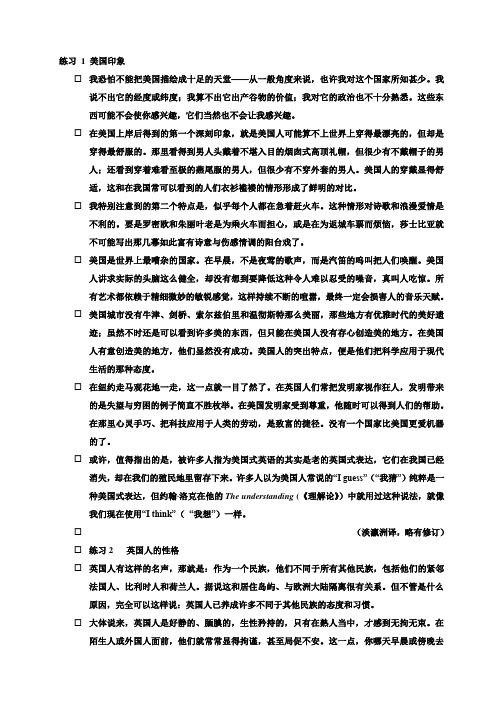
练习1 美国印象☐我恐怕不能把美国描绘成十足的天堂——从一般角度来说,也许我对这个国家所知甚少。
我说不出它的经度或纬度;我算不出它出产谷物的价值;我对它的政治也不十分熟悉。
这些东西可能不会使你感兴趣,它们当然也不会让我感兴趣。
☐在美国上岸后得到的第一个深刻印象,就是美国人可能算不上世界上穿得最漂亮的,但却是穿得最舒服的。
那里看得到男人头戴着不堪入目的烟囱式高顶礼帽,但很少有不戴帽子的男人;还看到穿着难看至极的燕尾服的男人,但很少有不穿外套的男人。
美国人的穿戴显得舒适,这和在我国常可以看到的人们衣衫褴褛的情形形成了鲜明的对比。
☐我特别注意到的第二个特点是,似乎每个人都在急着赶火车。
这种情形对诗歌和浪漫爱情是不利的。
要是罗密欧和朱丽叶老是为乘火车而担心,或是在为返城车票而烦恼,莎士比亚就不可能写出那几幕如此富有诗意与伤感情调的阳台戏了。
☐美国是世界上最嘈杂的国家。
在早晨,不是夜莺的歌声,而是汽笛的呜叫把人们唤醒。
美国人讲求实际的头脑这么健全,却没有想到要降低这种令人难以忍受的噪音,真叫人吃惊。
所有艺术都依赖于精细微妙的敏锐感觉,这样持续不断的喧嚣,最终一定会损害人的音乐天赋。
☐美国城市没有牛津、剑桥、索尔兹伯里和温彻斯特那么美丽,那些地方有优雅时代的美好遗迹;虽然不时还是可以看到许多美的东西,但只能在美国人没有存心创造美的地方。
在美国人有意创造美的地方,他们显然没有成功。
美国人的突出特点,便是他们把科学应用于现代生活的那种态度。
☐在纽约走马观花地一走,这一点就一目了然了。
在英国人们常把发明家视作狂人,发明带来的是失望与穷困的例子简直不胜枚举。
在美国发明家受到尊重,他随时可以得到人们的帮助。
在那里心灵手巧、把科技应用于人类的劳动,是致富的捷径。
没有一个国家比美国更爱机器的了。
☐或许,值得指出的是,被许多人指为美国式英语的其实是老的英国式表达,它们在我国已经消失,却在我们的殖民地里留存下来。
许多人以为美国人常说的“I guess”(“我猜”)纯粹是一种美国式表达,但约翰∙洛克在他的The understanding (《理解论》)中就用过这种说法,就像我们现在使用“I think”(“我想”)一样。
汉译英1-4
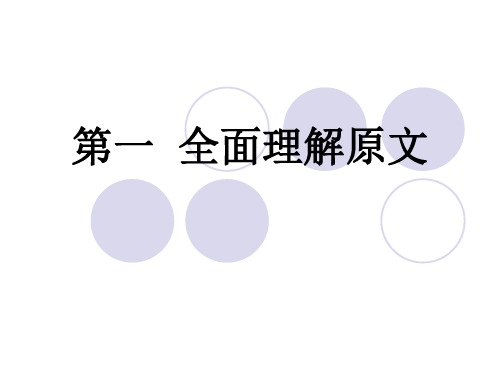
例7 全体伤员立即送进医院去了。 译文All the wounded were sent to the hospital right away. 例8 雄伟的人民大会堂给我们留下了深刻的印 象。 译文The magnificent Great Hall of the People impressed us tremendously. 名词转化为动词。 例9 我们必须充分利用自然资源,避免不必要 的浪费。 译文We must make full use of our natural resources and avoid unnecessary wastes. 副词转化为形容词。
第一 全面理解原文
翻译过程包括理解和表达两个阶段。只有在正确理解原 文的基础上,才能恰当地表达原文。全面理解原文指的是 对原文的词汇含义、语法关系、逻辑关系、习惯用法、修 辞、上下文等进行全面透彻的理解。 例1 一个人不向他人学习是不能指望有多大成就的。 译文 A man who doesn't try to learn from others can't hope to achieve much. 原文中主语部分是一个主谓短语,根据其逻辑关系,在 译成英语时转变为一个定语从句,这样结构清晰,表达清 楚。 例2 这是你那个问题的最佳解决方案。 译文 This is the best solution to your problem. 原文“最佳解决方案”前是一个定语,而译文根据 “solution” 这个词的特点,后面用不定式短语“to your problem”来修饰。类似的用法还有“an answer to your question”。
例4 我们中一半人反对他的建议。 译文Half of us are against his proposal.. 两句中的“赞成”和“反对”都是动词,但是根 据英语的表达习惯,转化为“in favor of”和 “against”两个介词(介词短语)。 例5 了解世界史,对学习时事是有帮助的。 译文 An acquaintance with world history is helpful to the study of current affairs. 动词转化为名词。 例6党支部书记很关心学生们的健康。 译文The party branch secretary showed great concern for the students' health. 动词转化为名词。
文学翻译(汉译英)
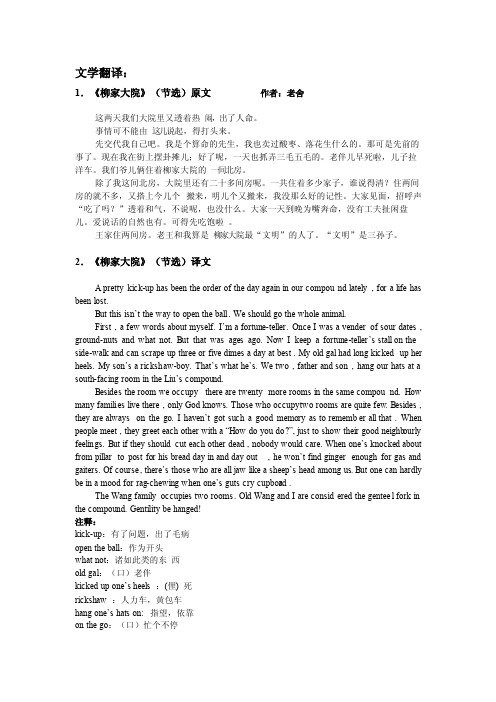
文学翻译:1.《柳家大院》(节选)原文作者:老舍这两天我们大院里又透着热闹,出了人命。
事情可不能由这儿说起,得打头来。
先交代我自己吧。
我是个算命的先生,我也卖过酸枣、落花生什么的。
那可是先前的事了。
现在我在街上摆卦摊儿;好了呢,一天也抓弄三毛五毛的。
老伴儿早死啦,儿子拉洋车。
我们爷儿俩住着柳家大院的一间北房。
除了我这间北房,大院里还有二十多间房呢。
一共住着多少家子,谁说得清?住两间房的就不多,又搭上今儿个搬来,明儿个又搬来,我没那么好的记性。
大家见面,招呼声“吃了吗?”透着和气,不说呢,也没什么。
大家一天到晚为嘴奔命,没有工夫扯闲盘儿。
爱说话的自然也有。
可得先吃饱啦。
王家住两间房。
老王和我算是柳家大院最“文明”的人了。
“文明”是三孙子。
2.《柳家大院》(节选)译文A prettykick-up has been the order of the day again in our compoun d lately, for a life has been lost.Butthisisn’tthewaytoopentheball. We shouldgo the whole animal.First , a few words about myself.I’mafortune-teller. Once I was a venderof sour dates , ground-nuts and what not. But that was ages ago. Now I keep a fortune-teller’sstallontheside-walk and can scrapeup three or five dimes a day at best. My old gal had long kickedup her heels. Myson’saricksha w-boy. That’swhathe’s. We two , fatherand son , hang our hats at a south-facingroom in the Liu’scompoun d.Besides the room we occupythere are twentymore rooms in the same compoun d. How many familie s live there , only God knows. Those who occupytwo rooms are quite few. Besides , they are alwaysonthego.Ihaven’tgotsuchagoodmemor yas to remembe r all that. When peoplemeet , theygreeteachotherwitha“Howdoyoudo?”, just to show their good neighbo urly feeling s. But if they shouldcut each other dead , nobodywould care. Whenone’sknocked about from pillarto post for his bread day in and day out , hewon’tfindgingerenoughfor gas and gaiters. Of course, there’sthosewhoarealljawlikeasheep’sheadamongus. But one can hardlybe in a mood for rag-chewingwhenone’sgutscrycupboar d .The Wang familyoccupie s two rooms. Old Wang and I are conside red the genteel fork in the compoun d. Gentili ty be hanged!注释:kick-up:有了问题,出了毛病open the ball:作为开头what not:诸如此类的东西old gal:(口)老伴kickedupone’sheels:(俚) 死ricksha w :人力车,黄包车hangone’shatson:指望,依靠on the go:(口)忙个不停cut sb. dead:不理睬某人knock about :(口)漂泊,游荡from pillarto post :四处奔走着,到处碰壁地,for his bread (俚) =for his moneyday in and day out :日复一日,每天不间断地ginger:(口)精力,活力,劲头gas :(俚)令人非常满意(或愉快的)的事(或人)bealljaw(likeasheep’shead):全是空话,废话连篇rag :(俚)姑娘,情人(指女性)guts:(用作单)贪食者be hanged:(用于诅咒语中)不得好死3.原文言语风格分析老舍先生是善于运用群众的言语大师。
汉译英1
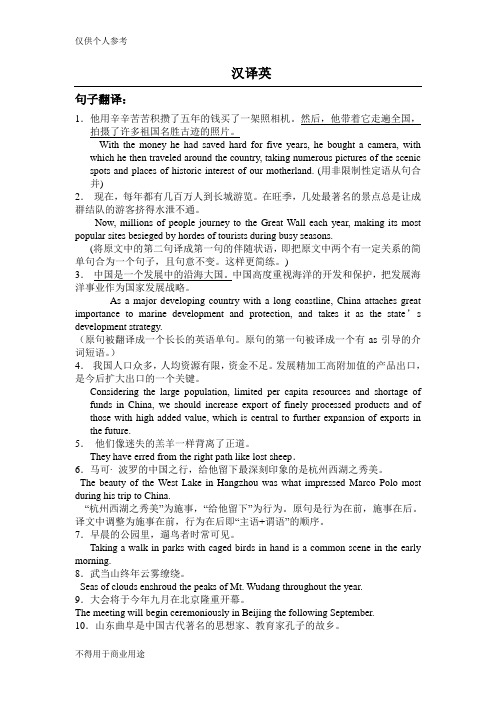
汉译英句子翻译:1.他用辛辛苦苦积攒了五年的钱买了一架照相机。
然后,他带着它走遍全国,拍摄了许多祖国名胜古迹的照片。
With the money he had saved hard for five years, he bought a camera, with which he then traveled around the country, taking numerous pictures of the scenic spots and places of historic interest of our motherland. (用非限制性定语从句合并)2.现在,每年都有几百万人到长城游览。
在旺季,几处最著名的景点总是让成群结队的游客挤得水泄不通。
Now, millions of people journey to the Great Wall each year, making its most popular sites besieged by hordes of tourists during busy seasons.(将原文中的第二句译成第一句的伴随状语,即把原文中两个有一定关系的简单句合为一个句子,且句意不变。
这样更简练。
)3.中国是一个发展中的沿海大国。
中国高度重视海洋的开发和保护,把发展海洋事业作为国家发展战略。
As a major developing country with a long coastline, China attaches great importance to marine development and protection, and takes it as the state’s development strategy.(原句被翻译成一个长长的英语单句。
原句的第一句被译成一个有as引导的介词短语。
)4.我国人口众多,人均资源有限,资金不足。
发展精加工高附加值的产品出口,是今后扩大出口的一个关键。
汉译英 习语翻译
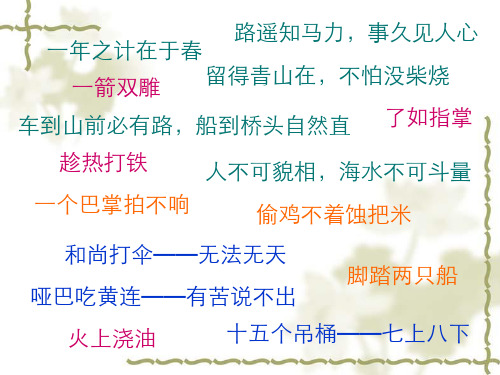
Features of Idioms
5、习语常利用声音的和谐来达到易懂易记、顺口入耳、生动有力的目的。 习语常利用声音的和谐来达到易懂易记、顺口入耳、生动有力的目的。 利用韵脚:狗咬吕洞宾,不识好人心;一招鲜,吃遍天;良药苦口利于病,忠言逆 利用韵脚 耳利于行; A friend in need is a friend indeed. East or west, home is best. Man proposes, God disposes. Health is better than wealth. Beggars should not be choosers. fair and square; high and dry; wear and tear. 利用双声: 利用双声:八面玲珑,聪明伶俐,慷慨激昂,明媚灿烂 Alliteration: as blind as a bat, as busy as a bee, as clear as crystal, as dead as a doornail, as cool as a cucumber, as red as a rose, as proud as a peacock, at sixes and sevens, spick and span, then and there through thick and thin tit for tat neither fish, flesh or fowl Care killed the cat. Money makes the mare to go. Many men, many minds. Speech is silver (silvern), silence is golden.
一年之计在于春 一箭双雕 趁热打铁 一个巴掌拍不响
(B)1 汉译英练习参考译文
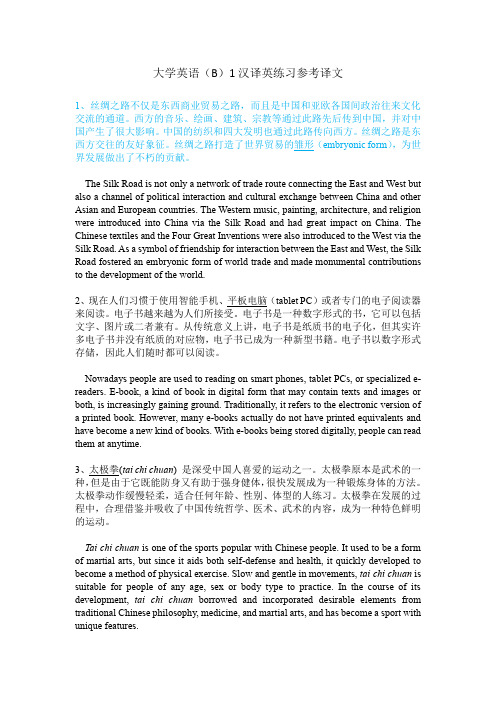
大学英语(B)1汉译英练习参考译文1、丝绸之路不仅是东西商业贸易之路,而且是中国和亚欧各国间政治往来文化交流的通道。
西方的音乐、绘画、建筑、宗教等通过此路先后传到中国,并对中国产生了很大影响。
中国的纺织和四大发明也通过此路传向西方。
丝绸之路是东西方交往的友好象征。
丝绸之路打造了世界贸易的雏形(embryonic form),为世界发展做出了不朽的贡献。
The Silk Road is not only a network of trade route connecting the East and West but also a channel of political interaction and cultural exchange between China and other Asian and European countries. The Western music, painting, architecture, and religion were introduced into China via the Silk Road and had great impact on China. The Chinese textiles and the Four Great Inventions were also introduced to the West via the Silk Road. As a symbol of friendship for interaction between the East and West, the Silk Road fostered an embryonic form of world trade and made monumental contributions to the development of the world.2、现在人们习惯于使用智能手机、平板电脑(tablet PC)或者专门的电子阅读器来阅读。
汉译英原文及参考译文
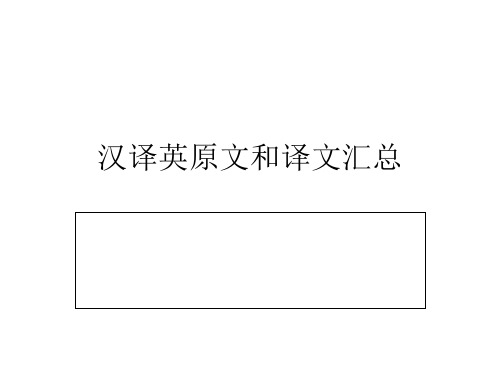
三、史学方法
史学方法是任何历史研究工作者必须学习的课程, 也是正确掌握历史研究的一种重要训练。它包括 史学家使用的各种技术和准则,通过他们史学家 用第一手资源和其他研究证据写出历史。在历史 哲学中,合理的历史方法的性质甚至还有可能性 等问题,被当作认识论问题提了出来。其追随者 则以外部批评、内部批评和综合法为标题,对史 学家在研究工作中常用的历史准则进行概括。 (173)
四、中国结
中国结是一种古老的编织艺术。中国人自汉 代就把中国结用作装饰。现在的人们仍然对传 统中国结复杂的美和编织秘密感到不解。“结” 在中文的含义是团聚、友谊、温暖和结婚,等 等。所以中国结也成为团聚、幸运、和谐和爱 的 象征。
制作传统的中国结必须用一根红绳弯曲、 打结、编织,喻义是无穷无尽的幸福生活的循 环。这是中国结最重要的特征。把不同的结和 其它的吉祥饰物巧妙的结合在一起,就是一个 独特的吉祥饰品,特别是代表美、幸福和愿望 的红色。
汉译英1-参考译文-国际经验与中国特色
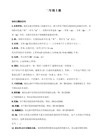
Beyond that, there is also the task of labor training. We must make sure that hundreds of millions of rural people, particularly the young, will get job training so as to enhance their skills to enter the workforce or to start their own business. On the issue of balancing regional economic development, we will, on the one hand, try to maintain the dynamics of economic growth of eastern costal areas and, on the other hand, make an all-out effort to vigorously develop the northeastern, central and western regions.
In the past century, the Chinese nation underwent untold sufferings, from which we can draw a profound lesson; one must always refrain from doing anything that is beneficial to oneself but harmful to others, or harmful to others but of no benefit to oneself. To put in another way, “What you do not want done to yourself, do not do to others”.
汉译英一二章
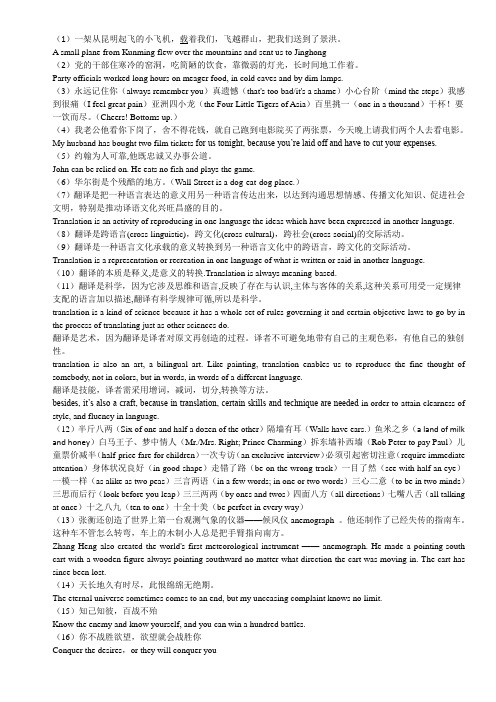
(1)一架从昆明起飞的小飞机,载着我们,飞越群山,把我们送到了景洪。
A small plane from Kunming flew over the mountains and sent us to Jinghong(2)党的干部住寒冷的窑洞,吃简陋的饮食,靠微弱的灯光,长时间地工作着。
Party officials worked long hours on meager food, in cold caves and by dim lamps.(3)永远记住你(always remember you)真遗憾(that's too bad/it's a shame)小心台阶(mind the steps)我感到很痛(I feel great pain)亚洲四小龙(the Four Little Tigers of Asia)百里挑一(one in a thousand)干杯!要一饮而尽。
(Cheers! Bottoms up.)(4)我老公他看你下岗了,舍不得花钱,就自己跑到电影院买了两张票,今天晚上请我们两个人去看电影。
My husband has bought two film tickets for us tonight, because you’re laid off and have to cut your expenses.(5)约翰为人可靠,他既忠诚又办事公道。
John can be relied on. He eats no fish and plays the game.(6)华尔街是个残酷的地方。
(Wall Street is a dog-eat-dog place.)(7)翻译是把一种语言表达的意义用另一种语言传达出来,以达到沟通思想情感、传播文化知识、促进社会文明,特别是推动译语文化兴旺昌盛的目的。
Translation is an activity of reproducing in one language the ideas which have been expressed in another language. (8)翻译是跨语言(cross-linguistic),跨文化(cross-cultural),跨社会(cross-social)的交际活动。
《英译汉教程》参考译文
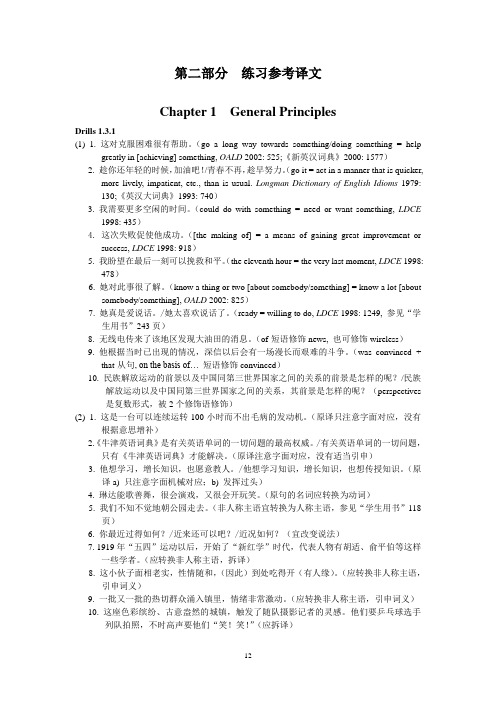
第二部分练习参考译文Chapter 1 General PrinciplesDrills 1.3.1(1) 1. 这对克服困难很有帮助。
(go a long way towards something/doing something = helpgreatly in [achieving] something, OALD 2002: 525;《新英汉词典》2000: 1577)2. 趁你还年轻的时候,加油吧!/青春不再,趁早努力。
(go it = act in a manner that is quicker,more lively, impatient, etc., than is usual. Longman Dictionary of English Idioms1979: 130;《英汉大词典》1993: 740)3. 我需要更多空闲的时间。
(could do with something = need or want something, LDCE1998: 435)4. 这次失败促使他成功。
([the making of] = a means of gaining great improvement orsuccess, LDCE 1998: 918)5. 我盼望在最后一刻可以挽救和平。
(the eleventh hour = the very last moment, LDCE 1998:478)6.她对此事很了解。
(know a thing or two [about somebody/something] = know a lot [aboutsomebody/something], OALD 2002: 825)7. 她真是爱说话。
/她太喜欢说话了。
(ready = willing to do, LDCE 1998: 1249, 参见“学生用书”243页)8.无线电传来了该地区发现大油田的消息。
汉译英参赛原文和参考译文

汉译英参赛原文矛盾的福建福建是名副其实的山地省,福建的山连绵不断,至海未绝。
福建的山地加丘陵,占到全省面积的90%多。
但福建的特殊性在于它还是一个海洋省,是中国最具海洋文明精神的一个省。
福建海洋文明的发育,也和福建的山地有关,正是这些大山,阻碍了福建与中原的联系,面向大海寻找出路是福建的最好选择。
福建的山地直逼入海,或者说大海入侵,直抵山脚,造成了福建的海岸水深崖陡,岸线曲折,海湾、海岛众多。
这是中国也是世界上最好的海岸,最适合建设大的港口,停靠大船。
但是很遗憾,造物主给了福建最适合建造港口的海岸,却没有给它与之相配的腹地。
这是福建的第一个矛盾。
福建的矛盾还有许多。
破碎的山地,高大的山脉,造成了封闭;曲折的海岸,优良的港湾,又哺育了福建人面向大海的开放意识。
这就是福建的又一个矛盾。
闽西客家人聚族而居的土楼与厦门鼓浪屿上那一幢幢有着希腊式廊柱的洋房是这个矛盾最好的注脚。
理解福建不仅要了解福建的矛盾性,还要理解福建的两极性。
福建在矛盾对立的两方都趋向极端。
比如海洋文明,福建比中国滨海的其他省区要发达得多,我觉得,如果把海洋文明理解为面对大海无所畏惧,敢于向海外移民和敢于出海通番经商的话,福建人就是中国最敢闯海的人。
福建人是最早“下南洋”、“闯东洋”的,东南亚遍布祖籍是福建的人;福建人又是最早出海做生意的人。
有人说广州人是“坐商”,自古就会招天下人来广州开“广交会”,而福建人是“行商”,自古就会乘着季风驾着帆船“下南洋”。
《福布斯》杂志曾刊出全球前十大华人富豪,其中四人祖籍是福建。
福建籍的华侨有1000多万,分布在五大洲一百多个国家和地区。
但如果我们说福建的文化是面向大海的开放的海洋文明,立刻就会招来反对,因为中华的传统文化在福建根基牢固,被保存得十分完好。
因为破碎化的山地,格子状的水系,造成了一个个割据的语言孤岛,一块块格子状的文化飞地,因此中华文化在这些孤岛和飞地中避免了被同化的命运。
许多古老的文化,到了福建破碎的山地中,就像化石一样被保留了下来。
汉译英口译文字材料
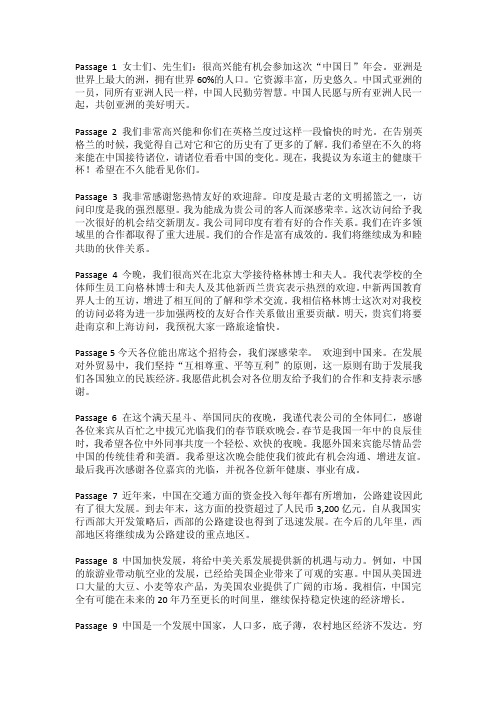
Passage 1 女士们、先生们:很高兴能有机会参加这次“中国日”年会。
亚洲是世界上最大的洲,拥有世界60%的人口。
它资源丰富,历史悠久。
中国式亚洲的一员,同所有亚洲人民一样,中国人民勤劳智慧。
中国人民愿与所有亚洲人民一起,共创亚洲的美好明天。
Passage 2 我们非常高兴能和你们在英格兰度过这样一段愉快的时光。
在告别英格兰的时候,我觉得自己对它和它的历史有了更多的了解。
我们希望在不久的将来能在中国接待诸位,请诸位看看中国的变化。
现在,我提议为东道主的健康干杯!希望在不久能看见你们。
Passage 3我非常感谢您热情友好的欢迎辞。
印度是最古老的文明摇篮之一,访问印度是我的强烈愿望。
我为能成为贵公司的客人而深感荣幸。
这次访问给予我一次很好的机会结交新朋友。
我公司同印度有着有好的合作关系。
我们在许多领域里的合作都取得了重大进展。
我们的合作是富有成效的。
我们将继续成为和睦共助的伙伴关系。
Passage 4今晚,我们很高兴在北京大学接待格林博士和夫人。
我代表学校的全体师生员工向格林博士和夫人及其他新西兰贵宾表示热烈的欢迎。
中新两国教育界人士的互访,增进了相互间的了解和学术交流。
我相信格林博士这次对对我校的访问必将为进一步加强两校的友好合作关系做出重要贡献。
明天,贵宾们将要赴南京和上海访问,我预祝大家一路旅途愉快。
Passage 5今天各位能出席这个招待会,我们深感荣幸。
欢迎到中国来。
在发展对外贸易中,我们坚持“互相尊重、平等互利”的原则,这一原则有助于发展我们各国独立的民族经济。
我愿借此机会对各位朋友给予我们的合作和支持表示感谢。
Passage 6 在这个满天星斗、举国同庆的夜晚,我谨代表公司的全体同仁,感谢各位来宾从百忙之中拔冗光临我们的春节联欢晚会。
春节是我国一年中的良辰佳时,我希望各位中外同事共度一个轻松、欢快的夜晚。
我愿外国来宾能尽情品尝中国的传统佳肴和美酒。
我希望这次晚会能使我们彼此有机会沟通、增进友谊。
汉译英第三次翻译练习1班——参考译文
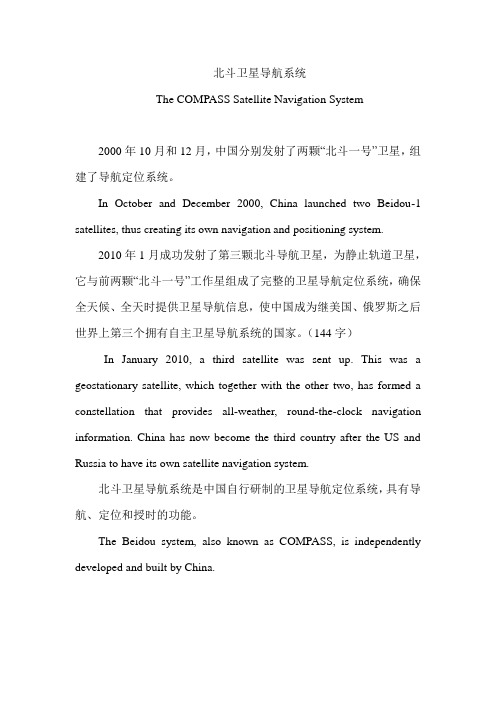
北斗卫星导航系统The COMPASS Satellite Navigation System2000年10月和12月,中国分别发射了两颗“北斗一号”卫星,组建了导航定位系统。
In October and December 2000, China launched two Beidou-1 satellites, thus creating its own navigation and positioning system.2010年1月成功发射了第三颗北斗导航卫星,为静止轨道卫星,它与前两颗“北斗一号”工作星组成了完整的卫星导航定位系统,确保全天候、全天时提供卫星导航信息,使中国成为继美国、俄罗斯之后世界上第三个拥有自主卫星导航系统的国家。
(144字)In January 2010, a third satellite was sent up. This was a geostationary satellite, which together with the other two, has formed a constellation that provides all-weather, round-the-clock navigation information. China has now become the third country after the US and Russia to have its own satellite navigation system.北斗卫星导航系统是中国自行研制的卫星导航定位系统,具有导航、定位和授时的功能。
The Beidou system, also known as COMPASS, is independently developed and built by China.这一系统已成功应用于测绘、电信、水利、渔业、交通运输、森林防火和国家安全等诸多领域,产生了显著的经济效益和社会效益。
翻译练习一(英译汉)
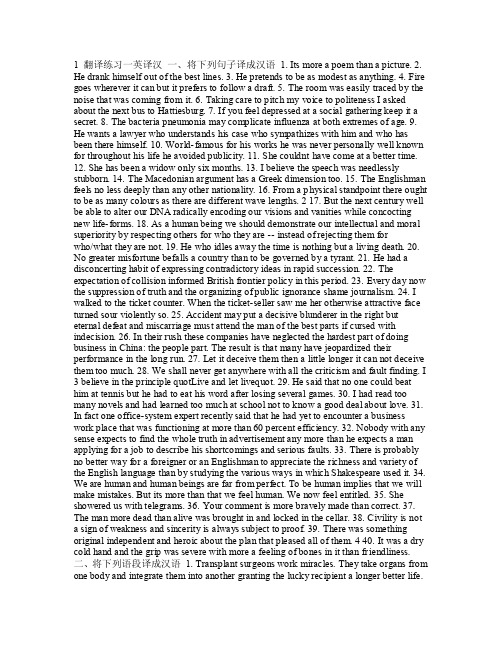
1 翻译练习一英译汉一、将下列句子译成汉语1. Its more a poem than a picture. 2. He drank himself out of the best lines. 3. He pretends to be as modest as anything. 4. Fire goes wherever it can but it prefers to follow a draft. 5. The room was easily traced by the noise that was coming from it. 6. Taking care to pitch my voice to politeness I asked about the next bus to Hattiesburg. 7. If you feel depressed at a social gathering keep it a secret. 8. The bacteria pneumonia may complicate influenza at both extremes of age. 9. He wants a lawyer who understands his case who sympathizes with him and who has been there himself. 10. World-famous for his works he was never personally well known for throughout his life he avoided publicity. 11. She couldnt have come at a better time.12. She has been a widow only six months. 13. I believe the speech was needlessly stubborn. 14. The Macedonian argument has a Greek dimension too. 15. The Englishman feels no less deeply than any other nationality. 16. From a physical standpoint there ought to be as many colours as there are different wave lengths. 2 17. But the next century well be able to alter our DNA radically encoding our visions and vanities while concocting new life-forms. 18. As a human being we should demonstrate our intellectual and moral superiority by respecting others for who they are -- instead of rejecting them forwho/what they are not. 19. He who idles away the time is nothing but a living death. 20. No greater misfortune befalls a country than to be governed by a tyrant. 21. He had a disconcerting habit of expressing contradictory ideas in rapid succession. 22. The expectation of collision informed British frontier policy in this period. 23. Every day now the suppression of truth and the organizing of public ignorance shame journalism. 24. I walked to the ticket counter. When the ticket-seller saw me her otherwise attractive face turned sour violently so. 25. Accident may put a decisive blunderer in the right but eternal defeat and miscarriage must attend the man of the best parts if cursed with indecision. 26. In their rush these companies have neglected the hardest part of doing business in China: the people part. The result is that many have jeopardized their performance in the long run. 27. Let it deceive them then a little longer it can not deceive them too much. 28. We shall never get anywhere with all the criticism and fault finding. I 3 believe in the principle quotLive and let livequot. 29. He said that no one could beat him at tennis but he had to eat his word after losing several games. 30. I had read too many novels and had learned too much at school not to know a good deal about love. 31. In fact one office-system expert recently said that he had yet to encounter a business work place that was functioning at more than 60 percent efficiency. 32. Nobody with any sense expects to find the whole truth in advertisement any more than he expects a man applying for a job to describe his shortcomings and serious faults. 33. There is probably no better way for a foreigner or an Englishman to appreciate the richness and variety of the English language than by studying the various ways in which Shakespeare used it. 34. We are human and human beings are far from perfect. To be human implies that we will make mistakes. But its more than that we feel human. We now feel entitled. 35. She showered us with telegrams. 36. Your comment is more bravely made than correct. 37. The man more dead than alive was brought in and locked in the cellar. 38. Civility is not a sign of weakness and sincerity is always subject to proof. 39. There was something original independent and heroic about the plan that pleased all of them. 4 40. It was a dry cold hand and the grip was severe with more a feeling of bones in it than friendliness. 二、将下列语段译成汉语1. Transplant surgeons work miracles. They take organs from one body and integrate them into another granting the lucky recipient a longer better life.Sadly every year thousands of other people are less fortunate dying while they wait for suitable organs to be found. The terrible constraint on organ transplantation is that every life extended depends on the death of someone young enough and healthy enough to have organs worth transplanting. Such donors are few. The waiting lists are long and getting longer. 2. Freedom from this constraint is the dream of every transplant surgeon. So far attempts to make artificial organs have been disappointing: nature is hard to mimic. Hence the renewed interest in trying to use organs from animals. 3. Doctors in India have just announced that they have successfully transplanted a heart from a pig into a person. Pressure to increase the number of such xenotransplants异种器官移植seems to be growing. In Europe and America herds of pigs are being specially bred and genetically engineered for organ donation. During 1996 at least two big 5 reports on the subject -- one in Europe and one in America -- were published. They agreed that xenotransplants were permissible on ethical groundsand cautiously recommended that they be allowed. Americas Food and Drug Administration has already published draft guidelines for xenotransplantation. 4. The ethics of xenotransplantation are relatively unworrying. People already kill pigs both for food and for sport killing them to save a human life seems if anything easier to justify. However the science of xenotransplantation is much less straightforward. 5. Ill never forget the feeling I got one winter night as I walked the deserted streets after many grueling hours at the hospital. I suddenly realized that I no longer felt tense or tired. All the worries about my patients illnesses as well as my own personal cares seemed to evaporate as quickly as the smoky vapor of my breath in the frosty night. As I incorporated walking into my schedule not only were my spirits lifted but my weight and blood pressure were gradually reduced. I began reviewing the medical literature on walking. From this research and my clinical observations as a family physician I found that it is possible to walk your way to better health a trimmer body and a longer life -- no matter what your age. 6 翻译练习一英译汉参考答案一、将下列句子译成汉语 1. 与其说那是一幅画不如说那是一首诗。
英译汉翻译作业2(1)
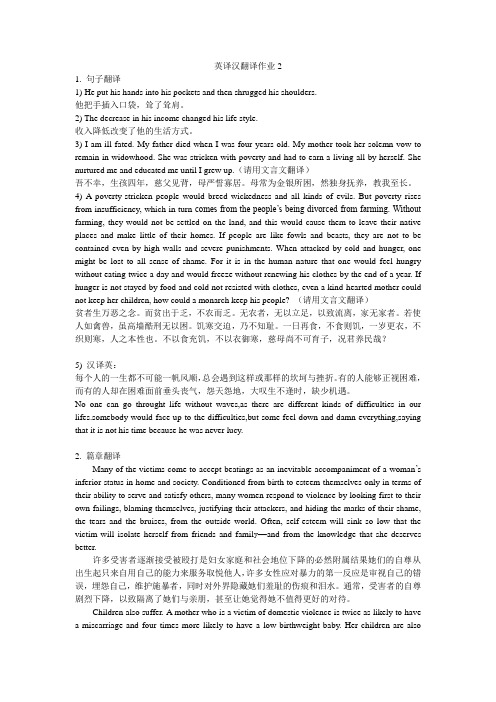
英译汉翻译作业21. 句子翻译1) He put his hands into his pockets and then shrugged his shoulders.他把手插入口袋,耸了耸肩。
2) The decrease in his income changed his life style.收入降低改变了他的生活方式。
3) I am ill-fated. My father died when I was four years old. My mother took her solemn vow to remain in widowhood. She was stricken with poverty and had to earn a living all by herself. She nurtured me and educated me until I grew up.(请用文言文翻译)吾不幸,生孩四年,慈父见背,母严誓寡居。
母常为金银所困,然独身抚养,教我至长。
4) A poverty-stricken people would breed wickedness and all kinds of evils. But poverty rises from insufficiency, which in turn comes from the people’s being divorced from farming. Without farming, they would not be settled on the land, and this would cause them to leave their native places and make little of their homes. If people are like fowls and beasts, they are not to be contained even by high walls and severe punishments. When attacked by cold and hunger, one might be lost to all sense of shame. For it is in the human nature that one would feel hungry without eating twice a day and would freeze without renewing his clothes by the end of a year. If hunger is not stayed by food and cold not resisted with clothes, even a kind-hearted mother could not keep her children, how could a monarch keep his people? (请用文言文翻译)贫者生万恶之念。
汉译英翻译(1)(1)
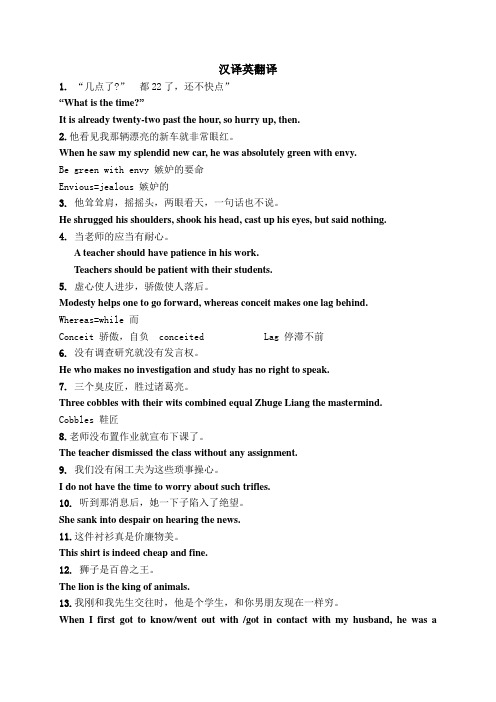
汉译英翻译1. “几点了?”都22了,还不快点”“What is the time?”It is already twenty-two past the hour, so hurry up, then.2.他看见我那辆漂亮的新车就非常眼红。
When he saw my splendid new car, he was absolutely green with envy.Be green with envy 嫉妒的要命Envious=jealous 嫉妒的3.他耸耸肩,摇摇头,两眼看天,一句话也不说。
He shrugged his shoulders, shook his head, cast up his eyes, but said nothing.4. 当老师的应当有耐心。
A teacher should have patience in his work.Teachers should be patient with their students.5. 虚心使人进步,骄傲使人落后。
Modesty helps one to go forward, whereas conceit makes one lag behind.Whereas=while 而Conceit 骄傲,自负 conceited Lag 停滞不前6. 没有调查研究就没有发言权。
He who makes no investigation and study has no right to speak.7. 三个臭皮匠,胜过诸葛亮。
Three cobbles with their wits combined equal Zhuge Liang the mastermind.Cobbles 鞋匠8.老师没布置作业就宣布下课了。
The teacher dismissed the class without any assignment.9. 我们没有闲工夫为这些琐事操心。
汉译英练习答案
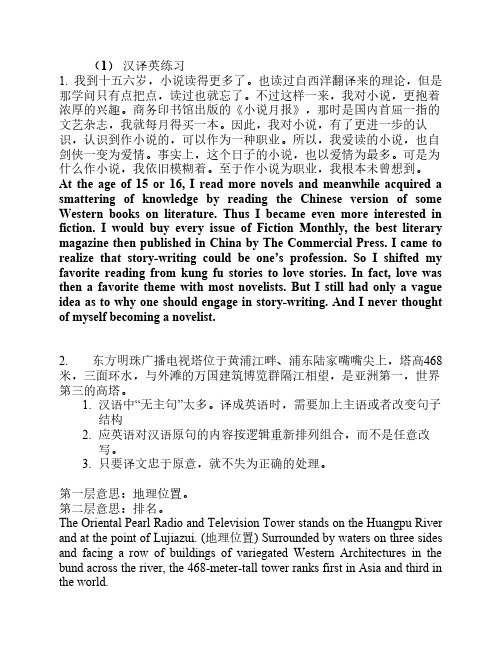
(1)汉译英练习1. 我到十五六岁,小说读得更多了。
也读过自西洋翻译来的理论,但是那学问只有点把点,读过也就忘了。
不过这样一来,我对小说,更抱着浓厚的兴趣。
商务印书馆出版的《小说月报》,那时是国内首屈一指的文艺杂志,我就每月得买一本。
因此,我对小说,有了更进一步的认识,认识到作小说的,可以作为一种职业。
所以,我爱读的小说,也自剑侠一变为爱情。
事实上,这个日子的小说,也以爱情为最多。
可是为什么作小说,我依旧模糊着。
至于作小说为职业,我根本未曾想到。
At the age of 15 or 16, I read more novels and meanwhile acquired a smattering of knowledge by reading the Chinese version of some Western books on literature. Thus I became even more interested in fiction. I would buy every issue of Fiction Monthly, the best literary magazine then published in China by The Commercial Press. I came to realize that story-writing could be one’s profession. So I shifted my favorite reading from kung fu stories to love stories. In fact, love was then a favorite theme with most novelists. But I still had only a vague idea as to why one should engage in story-writing. And I never thought of myself becoming a novelist.2. 东方明珠广播电视塔位于黄浦江畔、浦东陆家嘴嘴尖上,塔高468米,三面环水,与外滩的万国建筑博览群隔江相望,是亚洲第一,世界第三的高塔。
- 1、下载文档前请自行甄别文档内容的完整性,平台不提供额外的编辑、内容补充、找答案等附加服务。
- 2、"仅部分预览"的文档,不可在线预览部分如存在完整性等问题,可反馈申请退款(可完整预览的文档不适用该条件!)。
- 3、如文档侵犯您的权益,请联系客服反馈,我们会尽快为您处理(人工客服工作时间:9:00-18:30)。
Please translate the following passage into English.
女儿夫妇约我晚膳,我们大家见面的时候,聊个不停,女儿忽然脸色凝重对我说:“昨晚我很伤心,大哭了一场。
”她还没把话说完,我已急着问她到底发生了什么事?
My daughter and her husband invited me to dinner. We chattered a lot over the meal. All of a sudden, my daughter looked very grave and said to me, “I was very sad last night. I cried for a long time.” Before she had quite finished, I hastened to ask what had happened.
[注释] “见面的时候,聊个不停”,根据前文应理解为“见面、进餐时聊个不停”,故译为“chattered a lot over the meal”。
“脸色凝重”译为“looked very grave”。
女儿看见我很认真的问她,她又满脸笑容向我解释:“妈,你放心,我只是看了一个韩国电影,因为剧情凄怨感人,使我愈看愈伤心,跟着情绪非常的激动,我按捺不住,便放声大哭了,看完戏之后,眼睛已揉得又红又肿、鼻子也捏痛了。
”
Sensing the anxiety in my face, she quickly broke into a smile and explained, “Mom, don’t be alarmed. It’s the South Korean film I watched. The story is very sad. As the plot developed, I became more and more responsive and grief-stricken. Unable to control myself, I burst out crying. When the show was over, my eyes were red and swollen, and my nose hurt badly with too much wiping. ”
[注释] “认真的(地)”在此处不宜译作seriously,seriously 是认真地,非玩笑地。
根据淑婉着急的心态,试译为anxiety。
“满脸笑容”不译为full of smiles, 而译为broke into a smile, 以此描述她女儿表情瞬间的转换。
“你放心”,按上下文推论,译作don’t be alarmed,因为淑婉以为大事不妙,十分惊慌;她女儿请她不必担心。
“……,使我愈看愈伤心,……”。
此处的“愈……愈……”,不译作the … , the …,因为淑婉的女儿在这里的意思只可能是故事展开后,剧情更令人伤心。
所以译为:as the plot developed, …。
“情绪非常的激动”,如译作excited,则远未刻画出当时她女儿的悲伤心态。
根据前文试译为grief-stricken一词。
“看完戏之后,……”不宜译作I’ve finished seeing the film。
试译作更为地道的表达:When the show was over, …。
“……,眼睛已揉得又红又肿、鼻子也捏痛了。
”这里的两个动词(“揉”和“捏”)都不宜按字典直译。
我听后,真替她难受,我从没看过有人因看戏而令自己悲伤心情达到极点的。
我劝她不要自寻烦恼,每天下班回家已经疲累不堪,要纾解自己的工作压力,却为一个苦情戏,耗掉这么多眼泪,值得吗?
Having heard her out, I felt sorry for her sake. I have never known a person saddened to such an extreme over a mere play. “Don’t look for misery, ”I advised her. “You are exhaust ed enough after a very long day’s work. What you need is relaxation and recreation. Do you think it is worthwhile to shed so many tears over a sentimental tale?”
[注释] “我听后,……,…….达到极点的”。
这部分可用拆分法译成独立的两句。
“因看戏”的参考译文是“…over a mere play”,“mere”为加强语气而增添,与后面
的“值得吗”相照应。
从“我劝她”起,译文换用direct speech ,更方便更生动些。
注意引号内外的标点符号,和译文中添加的主语。
“要纾解自己的工作压力”,译为“What you need is relaxation and recreation”,这样译以求得更好的音韵效果。
“苦情戏”,译作a sentimental play。
我想,戏里的感人故事,正是反映人生的事实,所谓人生如戏,戏如人生,看看这个世界,每天都有不幸与痛苦的事情发生,耳闻目睹都使人流泪。
人生不幸的际遇,我曾经经历过,无奈之余,只好把人生当成一出戏。
In my opinion, the touching story in a play reflects life. That is why people say life is a play, which in turn represents life. In this world of ours, misfortunes and miseries are here, there and everywhere. They will bring tears to anyone who witnesses or even hears of them. Having been through so much, I feel resigned. Hence, to me, life is just a drama.
[注释] resign vt. 顺从;听命于(resign oneself to sth.)
此部分要尽量使译文传意、传神,但不宜过抠、过死。
misfortunes(不幸)与miseries(痛苦)二者所指不一,联用有押韵效果。
“耳闻目睹都使人流泪。
”用They(指上一句的misfortunes和miseries)作主语,意指上述的情况,让句子的连贯性更好。
even,系根据内容合理添加。
我很少看赚人眼泪的戏,以免情绪低沉而难过,近几年来,我多选看惹笑的喜剧,无厘头的戏也去欣赏一番,因为它能令我开怀大笑,笑把恼人的世事抛诸脑后,人也乐观起来。
I seldom watch tear-jerking plays, because I don’t want to find myself in low spirits or even feeling miserable. In recent years, I prefer slapstick comedies, not excluding silly sit-com. They often make me laugh loud so much so that forgetting about the cares and worries of the world, then I become optimistic.
[注释] tear-jerker n. 催人泪下的电影或故事
tear-jerking a. 催人泪下的
slapstick comedy n. 无聊的喜剧,闹剧
sit-com (situation comedy) n. 情景喜剧
so much so that …如此程度以致……
“情绪低沉而难过”。
这里的“而”似不表示因果关系,所描述的两种情绪似构成了发展的两个不同层次。
所以译为“find myself in low spirits or even feeling miserable”。
人生无常,要珍惜现在,及时行乐,这样做人才活得愉快。
(淑婉《爱看喜剧》)Life being fickle / impermanent / transient, let’s treasure and enjoy every minute of it. That’s how to live.
Shu Wan I Love Comdy [注释] “人生无常”。
按照《俗语佛源》(“佛教谓世间一切事物不能久住,都处于生死成坏之中,故为无常”),“无常”可译成:fickle, transient, impermanent, vicissitudinous等。
